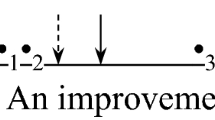Abstract
The theme is Arrow's requirement in his theorem of 1951 on methods for group choice, that the choice be independent of irrelevant alternatives. The attention is drawn to (1) his own explanation of this requirement in 1972, which is a quite different understanding than has been discussed in the voluminous literature on the theorem, (2) that Arrow, in fact, in 1985 showed an understanding for how “irrelevant alternatives” might in a meaningful way influence the group choice, (3) that admittedly the border-line between irrelevant and relevant alternatives in Arrow's original statement is arbitrary, and (4) that Arrow, if he had observed the final thought in the origin of the group theory by Borda, which he admittedly did not, might have realized that Borda's method stringently estimates the relevance of each alternative for the result.
The author expresses his surprise that a theoretical conclusion based on an arbitrary fundament has been admired so long.
Similar content being viewed by others
References
Arrow, K. J. (1972). ‘General economic equilibrium: purpose, analytic techniques, collective choice’, pp. 209–31 inLex Prix Nobel en 1972.
Arrow, K. J. (1951).Social Choice and Individual Values. New York: John Wiley.
Arrow, K. J. (1963).Social Choice and Individual Values (2nd edn.). New Haven: Yale University Press.
Bentzel, R. (1972). ‘The prize for economic science, in memory of Alfred Nobel’, pp. 203–3 inLes Prix Nobel en 1972.
Hansson, B. (1970). ‘Valsystem och besludsprocesser,’Minerva's kvartalsskrift 14: 190–198.
Höglund, B. (1991). ‘Rangordning och vinnare inom tÄvlingsidrott’, pp. 113–136 inGruppbeslut och rangordning — om demokratiska röstningsmetoder, ForskningsrådsnÄmnden, Stockholm.
MacKay, A. (1980).Arrow's Theorem. The Paradox of Social Choice. A Case Study in the Philosophy of Economics. New Haven: Yale University Press.
Newenhizen, J. V. (1992). ‘The Borda method is most likely to respect the Condorcet principle’,Economic Theory 2: 69–83.
Nurmi, H. (1991), ‘Preferences, choices, tournaments: alternative foundations for the evaluation of voting schemes’,Quality & Quantity 25: 393–405.
University of Oxford (1989). Faculty of social studies. Social Studies Faculty Centre, Working Paper 1/89.The Political Theory of Condorcet.
Riker, W. H. (1982).Liberalism Against Populism. A Confrontation between the Theory of Democracy and the Theory of Social Choice. San Francisco: W. H. Freeman and Company.
Sen, A. (1977). ‘Social choice theory: A re-examination’,Econometrica 45: 53–89.
Stefánsson, B. S. (1982). ‘Group choice among three or more alternatives’,Quality & Quantity 16: 433–54.
Stefánsson, B. S. (1991a). ‘Borda's method applied — The right to make a proposal. A historical note’,Quality & Quantity 25: 389–92.
Stefánsson, B. S. (1991b). ‘On irrelevant and infeasible alternatives’,Quality & Quantity 25: 297–306.
Author information
Authors and Affiliations
Rights and permissions
About this article
Cite this article
Stefánsson, B.S. On the fundamental thought behind voting rules. Qual Quant 29, 433–438 (1995). https://doi.org/10.1007/BF01106068
Issue Date:
DOI: https://doi.org/10.1007/BF01106068




